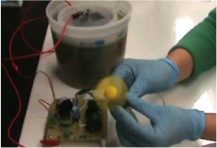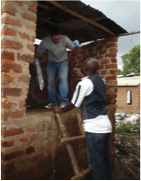- Resource recovery
- Resource recovery from excreta, faecal sludge or wastewater
- Production of biochar, fuel or electricity
- Bioelectric toilets for waste treatment and energy production (University of Colorado, USA)
Bioelectric toilets for waste treatment and energy production (University of Colorado, USA)
11.1k views
Re: Bioelectric toilets for waste treatment and energy production (University of Colorado, USA)
Thanks for the encouragement! While in our lab setup, the COD can be removed by 70-80% within a few days, we found it is more difficult to remove that much in the field test, mainly due to the slow mass transfer of solid waste. The LED lights are the same ones used on Christmas Trees. I don't have a number of power consumption, but one light is estimated around 50 mW.
Our group at University of Colorado is working on using new bioelectrochemical technologies to treat waste and produce energy and value-added chemicals. We look forward to any collaboration, so please feel free to contact me bioelectric2013 at gmail.com or zhiyong.ren at colorado.edu.
Zhiyong "Jason" Ren, Ph.D
Associate Professor
Environmental and Sustainability Engineering
University of Colorado Boulder, USA
zhiyong.ren at colorado.edu
spot.colorado.edu/~zhre0706/
Zhiyong "Jason" Ren, Ph.D
Associate Professor
Environmental and Sustainability Engineering
University of Colorado Boulder, USA
zhiyong.ren at colorado.edu
spot.colorado.edu/~zhre0706/
Please Log in to join the conversation.
You need to login to replyRe: Bioelectric toilets for waste treatment and energy production (University of Colorado, USA)
Thanks, Ioannis. The reactors we are operating are 5 gallons in the lab. We are trying to generate and store the power, so it can be used as needed.
We are more focusing on the solid fecal sludge utilization, but I found your urine work is very interesting!
We are more focusing on the solid fecal sludge utilization, but I found your urine work is very interesting!
Our group at University of Colorado is working on using new bioelectrochemical technologies to treat waste and produce energy and value-added chemicals. We look forward to any collaboration, so please feel free to contact me bioelectric2013 at gmail.com or zhiyong.ren at colorado.edu.
Zhiyong "Jason" Ren, Ph.D
Associate Professor
Environmental and Sustainability Engineering
University of Colorado Boulder, USA
zhiyong.ren at colorado.edu
spot.colorado.edu/~zhre0706/
Zhiyong "Jason" Ren, Ph.D
Associate Professor
Environmental and Sustainability Engineering
University of Colorado Boulder, USA
zhiyong.ren at colorado.edu
spot.colorado.edu/~zhre0706/
Please Log in to join the conversation.
You need to login to reply- former member
-
Less
- Posts: 101
- Likes received: 3
Re: Bioelectric toilets for waste treatment and energy production (University of Colorado, USA)
Jason, you've got some interesting results!
I'm curious how much of the biodegradation is actually converted into electricity. How much power is required by the LEDs lit by your unit? I'm wondering if most of your waste stabilization could actually be by methane production, since methanogenic bacteria might be competing with electrogenic bacteria.
++++++++
Note by moderators: This post was made by a former user with the login name skdentel who is no longer a member of this discussion forum.
I'm curious how much of the biodegradation is actually converted into electricity. How much power is required by the LEDs lit by your unit? I'm wondering if most of your waste stabilization could actually be by methane production, since methanogenic bacteria might be competing with electrogenic bacteria.
++++++++
Note by moderators: This post was made by a former user with the login name skdentel who is no longer a member of this discussion forum.
Please Log in to join the conversation.
You need to login to reply- iaieropoulos
-

- Converting waste into useful energy
Less- Posts: 11
- Karma: 1
- Likes received: 3
Re: Bioelectric toilets for waste treatment and energy production (University of Colorado, USA)
This is wonderful as more and more people are thinking about turning an under-utilised resource (i.e. waste) into useful energy.
It would be useful if the power was given in absolute terms, rather than in nornalised terms, since then it may be possible to understand how much power is actually generated. It would also be useful to know the size of the lab reactor which produced 8W/m^3.
Nice work - well done.
Kind regards,
Yannis
It would be useful if the power was given in absolute terms, rather than in nornalised terms, since then it may be possible to understand how much power is actually generated. It would also be useful to know the size of the lab reactor which produced 8W/m^3.
Nice work - well done.
Kind regards,
Yannis
Dr. Ioannis A. Ieropoulos
Associate Professor
EPSRC Career Acceleration Fellow
BioEnergy & Self Sustainable Systems Theme Leader
Bristol Robotics Laboratory
T-Building
Frenchay Campus, (North Entrance)
Bristol, BS16 1QY
Tel: +44(0)1173286318, 86322 Fax: +44(0)1173283960
Email: This email address is being protected from spambots. You need JavaScript enabled to view it. Web: www.brl.ac.uk/researchthemes/bioenergyselfsustainable.aspx
Associate Professor
EPSRC Career Acceleration Fellow
BioEnergy & Self Sustainable Systems Theme Leader
Bristol Robotics Laboratory
T-Building
Frenchay Campus, (North Entrance)
Bristol, BS16 1QY
Tel: +44(0)1173286318, 86322 Fax: +44(0)1173283960
Email: This email address is being protected from spambots. You need JavaScript enabled to view it. Web: www.brl.ac.uk/researchthemes/bioenergyselfsustainable.aspx
Please Log in to join the conversation.
You need to login to replyRe: Bioelectric toilets for waste treatment and energy production (University of Colorado, USA)
Dear All,
I would like to introduce our technology and systems that are funded by the Bill & Melinda Gates Foundation. I am an associate professor at University of Colorado, USA, and we are focusing on developing bioelectric toilets that can directly convert human waste and other waste materials to electricity and other chemicals for household and other uses. We have been working on this platform technology for several years and are leading the R&D work in low-cost modular system development. I hope you find the information below interesting, and please feel free to contact me at bioelectric2013 at gmail.com or jason.ren at colorado.edu for any questions and collaboration opportunities.
Title of grant: Direct Electricity from Fecal Sludge in Bioelectric Systems
Subtitle (more descriptive title): Innovative modular bioelectric toilets for on site human and animal waste treatment, electricity generation, and chemical production and utilization.
Name of lead organization: University of Colorado
Primary contact at lead organization: Zhiyong “Jason” Ren
Grantee location: Boulder, Colorado
Developing country where the research is being tested: Uganda, and a few other countries in discussion
Start and end date: November 2011 to October 2013
Grant type: Grand Challenges Explorations, Round 7 (GCE R7)
Research or implementation partners: Water for People, Universities in several Countries in Africa
Goal(s): The goal of this project is to develop a low cost and easy-to-operate bioelectric reactor that uses microbes to break down waste and convert it to usable electricity and chemicals. This technology could provide a self-sustainable solution for communities in need of both sanitary waste disposal and an energy supply.
Activities or key research components:
We focus on developing low cost and easy-to-operate bioelectric toilets to treat fecal sludge and directly convert waste to usable electric energy and chemicals. The principle and operation of bioelectric toilets are relatively simple, but it represents a completely new method for high quality energy and chemical recovery from waste. In the reactor anode chamber, microorganisms degrade fecal sludge as their substrate and transfer electrons to the anode during anaerobic respiration. The electrons then flow to the cathode through external circuits, where they are harvested for electricity generation or chemical production. The electrodes can be low-cost and locally available materials. Indigenous bacteria can be used as catalysts on both the anode and air-cathode to reduce cost and promote sludge treatment.
Compared to current sludge processing technologies, the bioelectric toilet has several advantages that are suitable for onsite application in urban poor communities:
1. Our lab and field tests showed that the bioelectric toilet stabilizes and degrades >80% of fecal waste within a few days. Odor generating ammonia was removed by >75% in the same period. Reactor design shows that a 3-5 m3 reactor can sustainably handle the waste produced by a 100 people community.
2. The toilet doesn’t need any energy input except occasional manual mixing, so the electricity produced can be directly used by the community. Our prototype reactor produced 8 W/m3 electricity in the lab, and our field demonstration showed LED lights was powered by the toilet.
3. Experimental results showed that microbial communities were resilient to the variations of sludge loadings and environmental condition changes. Compared to the reduced performance of anaerobic digestion at low temperature, our system can keep its performance at even 4 °C.
4. The requirements of operation and maintenance of an established toilet can be minimal, as the microbial activity will be self-sustained and the sludge volume will be reduced significantly. The system can also be easily converted to an anaerobic digester if needed.
Links, further readings, etc:
Our group at University of Colorado has a good track record on bioelectric system development. Since 2010, we have published more than 20 journal articles and filed 2 patent disclosures, and we have obtained more than $2 million dollars in funding support from the Bill & Melinda Gates Foundation, National Science Foundation, Department of Defense, Environmental Protection Agency, and private sponsors. Our findings were reported by more than 200 media, including National Public Radio, ABC News, Science Daily, Scientific American, Discovery News, C&EN News, etc. For more information, please visit the following websites:
1. NPR report at Reinvent the Toilet Fair: www.npr.org/player/v2/mediaPlayer.html?a...58874028&m=158887964
2. ABC-7 News interviews about the Poop-to-Power project with Denver Zoo. www.thedenverchannel.com/news/26211364/detail.html
www.thedenverchannel.com/news/18753218/detail.html
3. Zhiyong (Jason) Ren Faculty Website (moving to Univ, of Colorado at Boulder as an Associate Professor in August, 2013)
carbon.ucdenver.edu/~jren/research.html
4. Journal Article: Wang, H., Park, J., and Ren, Z. Active Energy Harvesting from Microbial Fuel Cells at the Maximum Power Point without Using Resistors. Environ. Sci. Technol. 2012, 46(9), 5247-5252 carbon.ucdenver.edu/~jren/papers%20PDF/2...ive%20Harvesting.pdf
5. Journal Article: Ren, Z., Yan, H., Wang W., Mench, MM., and Regan, JM. Characterization of Microbial Fuel Cells at Microbially and Electrochemically Meaningful Timescales. Environ. Sci. Technol. 2011, 45(6), 2435-2441.
carbon.ucdenver.edu/~jren/papers%20PDF/2...0Rex%20es103115a.pdf
I would like to introduce our technology and systems that are funded by the Bill & Melinda Gates Foundation. I am an associate professor at University of Colorado, USA, and we are focusing on developing bioelectric toilets that can directly convert human waste and other waste materials to electricity and other chemicals for household and other uses. We have been working on this platform technology for several years and are leading the R&D work in low-cost modular system development. I hope you find the information below interesting, and please feel free to contact me at bioelectric2013 at gmail.com or jason.ren at colorado.edu for any questions and collaboration opportunities.
Title of grant: Direct Electricity from Fecal Sludge in Bioelectric Systems
Subtitle (more descriptive title): Innovative modular bioelectric toilets for on site human and animal waste treatment, electricity generation, and chemical production and utilization.
Name of lead organization: University of Colorado
Primary contact at lead organization: Zhiyong “Jason” Ren
Grantee location: Boulder, Colorado
Developing country where the research is being tested: Uganda, and a few other countries in discussion
Start and end date: November 2011 to October 2013
Grant type: Grand Challenges Explorations, Round 7 (GCE R7)
Research or implementation partners: Water for People, Universities in several Countries in Africa
Goal(s): The goal of this project is to develop a low cost and easy-to-operate bioelectric reactor that uses microbes to break down waste and convert it to usable electricity and chemicals. This technology could provide a self-sustainable solution for communities in need of both sanitary waste disposal and an energy supply.
Activities or key research components:
We focus on developing low cost and easy-to-operate bioelectric toilets to treat fecal sludge and directly convert waste to usable electric energy and chemicals. The principle and operation of bioelectric toilets are relatively simple, but it represents a completely new method for high quality energy and chemical recovery from waste. In the reactor anode chamber, microorganisms degrade fecal sludge as their substrate and transfer electrons to the anode during anaerobic respiration. The electrons then flow to the cathode through external circuits, where they are harvested for electricity generation or chemical production. The electrodes can be low-cost and locally available materials. Indigenous bacteria can be used as catalysts on both the anode and air-cathode to reduce cost and promote sludge treatment.
Compared to current sludge processing technologies, the bioelectric toilet has several advantages that are suitable for onsite application in urban poor communities:
1. Our lab and field tests showed that the bioelectric toilet stabilizes and degrades >80% of fecal waste within a few days. Odor generating ammonia was removed by >75% in the same period. Reactor design shows that a 3-5 m3 reactor can sustainably handle the waste produced by a 100 people community.
2. The toilet doesn’t need any energy input except occasional manual mixing, so the electricity produced can be directly used by the community. Our prototype reactor produced 8 W/m3 electricity in the lab, and our field demonstration showed LED lights was powered by the toilet.
3. Experimental results showed that microbial communities were resilient to the variations of sludge loadings and environmental condition changes. Compared to the reduced performance of anaerobic digestion at low temperature, our system can keep its performance at even 4 °C.
4. The requirements of operation and maintenance of an established toilet can be minimal, as the microbial activity will be self-sustained and the sludge volume will be reduced significantly. The system can also be easily converted to an anaerobic digester if needed.
Links, further readings, etc:
Our group at University of Colorado has a good track record on bioelectric system development. Since 2010, we have published more than 20 journal articles and filed 2 patent disclosures, and we have obtained more than $2 million dollars in funding support from the Bill & Melinda Gates Foundation, National Science Foundation, Department of Defense, Environmental Protection Agency, and private sponsors. Our findings were reported by more than 200 media, including National Public Radio, ABC News, Science Daily, Scientific American, Discovery News, C&EN News, etc. For more information, please visit the following websites:
1. NPR report at Reinvent the Toilet Fair: www.npr.org/player/v2/mediaPlayer.html?a...58874028&m=158887964
2. ABC-7 News interviews about the Poop-to-Power project with Denver Zoo. www.thedenverchannel.com/news/26211364/detail.html
www.thedenverchannel.com/news/18753218/detail.html
3. Zhiyong (Jason) Ren Faculty Website (moving to Univ, of Colorado at Boulder as an Associate Professor in August, 2013)
carbon.ucdenver.edu/~jren/research.html
4. Journal Article: Wang, H., Park, J., and Ren, Z. Active Energy Harvesting from Microbial Fuel Cells at the Maximum Power Point without Using Resistors. Environ. Sci. Technol. 2012, 46(9), 5247-5252 carbon.ucdenver.edu/~jren/papers%20PDF/2...ive%20Harvesting.pdf
5. Journal Article: Ren, Z., Yan, H., Wang W., Mench, MM., and Regan, JM. Characterization of Microbial Fuel Cells at Microbially and Electrochemically Meaningful Timescales. Environ. Sci. Technol. 2011, 45(6), 2435-2441.
carbon.ucdenver.edu/~jren/papers%20PDF/2...0Rex%20es103115a.pdf
Our group at University of Colorado is working on using new bioelectrochemical technologies to treat waste and produce energy and value-added chemicals. We look forward to any collaboration, so please feel free to contact me bioelectric2013 at gmail.com or zhiyong.ren at colorado.edu.
Zhiyong "Jason" Ren, Ph.D
Associate Professor
Environmental and Sustainability Engineering
University of Colorado Boulder, USA
zhiyong.ren at colorado.edu
spot.colorado.edu/~zhre0706/
Zhiyong "Jason" Ren, Ph.D
Associate Professor
Environmental and Sustainability Engineering
University of Colorado Boulder, USA
zhiyong.ren at colorado.edu
spot.colorado.edu/~zhre0706/
Attachments:
-
 Bioelectic1.jpg
(Filesize: 13KB)
Bioelectic1.jpg
(Filesize: 13KB)
-
 Bioelectic2.jpg
(Filesize: 14KB)
Bioelectic2.jpg
(Filesize: 14KB)
Please Log in to join the conversation.
You need to login to reply
It’s great to be part of this group! We focus on using bioelectrochemical systems to directly convert waste to electricity and other value-added products.
Check out our ABC-7 News interviews about the Poop-to-Power project with Denver Zoo.
ABC 7-News, Christmas Lights Powered By Poop: Research At UC Denver Proves Viability Of Waste As Energy Source
www.thedenverchannel.com/news/26211364/detail.html
ABC 7-News, Zoo Hopes to Turn Poop into Power:
www.thedenverchannel.com/news/18753218/detail.html
Check out our ABC-7 News interviews about the Poop-to-Power project with Denver Zoo.
ABC 7-News, Christmas Lights Powered By Poop: Research At UC Denver Proves Viability Of Waste As Energy Source
www.thedenverchannel.com/news/26211364/detail.html
ABC 7-News, Zoo Hopes to Turn Poop into Power:
www.thedenverchannel.com/news/18753218/detail.html
Our group at University of Colorado is working on using new bioelectrochemical technologies to treat waste and produce energy and value-added chemicals. We look forward to any collaboration, so please feel free to contact me bioelectric2013 at gmail.com or zhiyong.ren at colorado.edu.
Zhiyong "Jason" Ren, Ph.D
Associate Professor
Environmental and Sustainability Engineering
University of Colorado Boulder, USA
zhiyong.ren at colorado.edu
spot.colorado.edu/~zhre0706/
Zhiyong "Jason" Ren, Ph.D
Associate Professor
Environmental and Sustainability Engineering
University of Colorado Boulder, USA
zhiyong.ren at colorado.edu
spot.colorado.edu/~zhre0706/
Please Log in to join the conversation.
You need to login to reply
Share this thread:
- Resource recovery
- Resource recovery from excreta, faecal sludge or wastewater
- Production of biochar, fuel or electricity
- Bioelectric toilets for waste treatment and energy production (University of Colorado, USA)
Recently active users. Who else has been active?
Time to create page: 0.209 seconds







